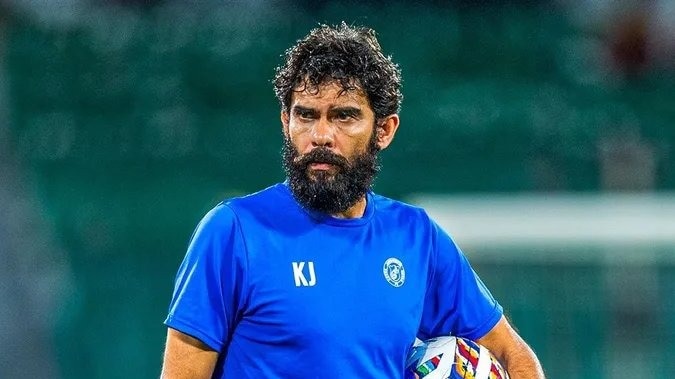
In 2025, keeping up with Indian football can resemble playing a faulty game—brief flashes of hope, followed by three periods of uncertainty, and an endless wait for a fix that never arrives. The men's national team has dropped to 132nd in the FIFA rankings, the head coach has resigned during the season, and the Indian Super League has been suddenly suspended. It's a plotline typical of a sports movie—but without any of the inspiring victories.
Manolo Marquez was expected to be "the one."He was brought in with the intention of guiding the next major transformation, set against the background of AIFF's "Vision 2047." However, after six matches and a single victory, he left without saying a word to his team, leaving more uncertainties than resolutions.
What was intended to be a well-organized long-term strategy has once more ended up in disarray for the short term. However, if the goal is to become a leading Asian football nation within 22 years, perhaps we should begin by avoiding turmoil for the next 22 months.
In the meantime, there's a noticeable change in atmosphere. Supporters are not only dissatisfied—they've lost interest. The system is perplexing, club football is in an uncertain state, and the national team's recent news has mainly focused on defeats and managerial changes. With the ISL currently suspended and the future plan unclear, there's a rising sense that Indian football is stuck in a temporary phase, awaiting the clarity that keeps eluding it.
But even within this chaotic situation, a major choice remains: Who will take over next?
Whether it's an established figure from Indian football or an external coach bringing new perspectives, this selection could significantly shape Vision 2047. That's why the next head coach appointment is crucial. Whether it's an experienced ISL strategist or a completely unexpected choice from abroad, this decision goes beyond just the survival of Indian football, and here are some of our recommendations for the position:
Khalid Jamil: The public's favorite?
There's a certain poetic element to Khalid Jamil returning to the spotlight. As the first Indian head coach to lead an ISL team (NorthEast United, to be specific) to the semifinals, Jamil understands how to manage limited budgets and intense pressure. He possesses a straightforward personality, tactical resilience, and a successful history in Indian football. Most importantly, he remains connected to the I-League and the grassroots system—where, let's be honest, the true talent pool continues to reside.
But would AIFF entrust an Indian coach with leadership during this critical period? Historically, they have not. However, if they are genuinely committed to building a solid framework and ensuring long-term viability, Jamil might be a reasonable starting point.
Antonio Lopez Habas: The journey of redemption
It is reported that Habas applied for the position of India's head coach prior to Manolo being selected. He was not chosen, so what did he do next? Rather, he became part of a newly established team—Inter Kashi—who secured the I-League title and immediately advanced to the ISL. This highlights his strong drive. He has already won two ISL championships, has a deep understanding of the challenges within Indian football, and is highly respected.
Having secured two ISL titles and possessing a thorough grasp of Indian football's dynamic and unpredictable environment, Habas offers traditional discipline and experience in tournaments. While he may not be the most thrilling choice, he is someone who delivers results - and at this moment, that is a rare trait.
Owen Coyle: Mr. Enthusiasm, once more?
Owen Coyle has been recently released by Chennaiyin FC, yet his achievements in Indian football are difficult to overlook. He transformed a struggling Jamshedpur FC team into League Shield champions in 2022 and led Chennaiyin to two playoff participations, proving his ability to create strong teams from the ground up.
He possesses charm, leadership abilities, and a strong connection with Indian players. However, the issue persists: does he have the tactical flexibility required to guide a national team? Or is he more effective in club football, where short-term motivation is more impactful than long-term strategies?
A fresh appearance: Why not?
Let's face it – when Igor Stimac was hired in 2019, many Indian supporters couldn't locate him outside of a Google result. Of course, things didn't exactly unfold as expected. However, this doesn't imply that the concept of bringing in an unfamiliar yet seasoned global coach should be discarded.
With proper scouting, preparation, and sustained support (we understand, that's a big request), an unconventional choice might bring positive changes. A person familiar with the national team environments in Asia or Africa, who understands how to operate with limited resources and establish organized systems from the ground up. It's a gamble—but at this stage, what isn't?
The manager alone cannot resolve all issues, but if selected properly, he could potentially serve as the stabilizing element that Indian football urgently requires.

Posting Komentar